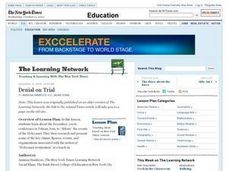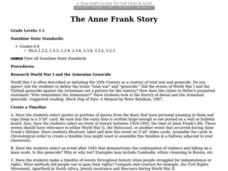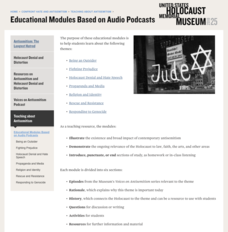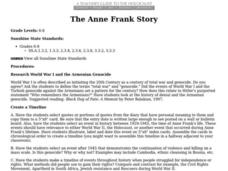Curated OER
Holocaust Denials
Do people deny that the Holocaust occurred? When posed with this question in class, high schoolers answer with a discussion on relativism, historical perspectives, and anti-Semitic historians. The presentation is full of information that...
Curated OER
Denial on Trial
What is the "Faurisson Affair”? What is “Holocaust Revisionism”? What does freedom of speech entail? Do revisionists have a right to voice their ideas? Such questions are at the heart of a richly detailed, thought provoking lesson...
Echoes & Reflections
Studying The Holocaust
While many young scholars are familiar with the Holocaust, they may not understand the specific history that led to the unprecedented atrocity. The first lesson in the unit helps teachers gauge their pupils' background knowledge. A...
Echoes & Reflections
The Children and Legacies Beyond the Holocaust
Using video testimony, primary source documents that detail international agreements, and structured discussions, learners consider the precarious position of children during the Holocaust and other international conflicts, and how to...
Curated OER
Anti-Semitism Workshop
Originating from the Yad Vashem Holocaust Memorial Museum in Jerusalem, here is a resource to support your world historians in their study of World War II, the Holocaust, your cultural scholars learning about anti-semitism, or your...
Echoes & Reflections
Nazi Germany
The Holocaust was an evolution of anti-Semitism, scapegoating, and targeted violence against Jews with Nazi policies. A resource unpacks the escalation in violence, along with the erosion of democratic institutions, during the 1930s....
University of Southern California
Deconstructing Genocide: The Ultimate Crime Against Humanity
There are eight stages of an atrocity known as genocide, and it's important to understand how they are represented so we can fight against it in the future. As young historians watch video clips of ten Jewish Holocaust survivors'...
Curated OER
Intolerance in American History
Examine the United States through the lens of intolerance using this 2-week unit plan, which includes details for 13 days of instruction. Scholars study examples of prejudiced behavior throughout history, discuss issues in groups,...
Echoes & Reflections
Jewish Resistance
Resistance to the Holocaust took on many forms. Learners explore the passive and active resistance of Jewish people who continued their practices and observances, as well as organized resistance against the evils of the Nazis. An...
Echoes & Reflections
Rescuers and Non-Jewish Resistance
What does it mean to be a rescuer during the time of the Holocaust? Learners consider the role of those who resisted the Nazi invasions, including hiding Jewish people, throughout Europe. Activities include listening to the testimony of...
Curated OER
Holocaust Studies
Eleventh graders trace the history of intolerance in American history and familiarize themselves with the actions of the United States towards the Holocaust. They explore present day Holocaust denial and Neo-Nazism in the United States.
Curated OER
Nazi Germany Through An Examination of the Holocaust
Tenth graders read, analyze, evaluate, synthesize and present their ideas through multi-media about events of the Holocaust and Nazi Germany.
Echoes & Reflections
Contemporary Antisemitism
Despite the recognized atrocities of the Holocaust, anti-semitism continues. The 11th and final installment of the Teaching the Holocaust series explores the long-term effects of the Holocaust on modern anti-semitism, asking pupils to...
Echoes & Reflections
Antisemitism
Propaganda and anti-semitism were linked to evil ends during the Holocaust. Using video testimony of Holocaust survivors, examples of Nazi propaganda, and discussion questions, learners explore the roots of anti-semitism in Europe and...
Echoes & Reflections
Perpetrators, Collaborators, and Bystanders
After the Holocaust, the world grappled with how to bring justice to the Nazis. But what to do with the thousands—if not millions—who allowed it to happen? Young historians consider the issues of guilt, collaboration, and responsibility...
Curated OER
The Anne Frank Story
What is genocide? Create timelines regarding the human genocide. Middle and high schoolers analyze information that requires them to consider links between Armenian genocide and the Holocaust. In groups, theydesign timelines that...
US Holocaust Museum
Educational Modules Based on Audio Podcasts
Imagine hearing someone claim an event like the Holocaust never happened. Pupils use audio podcasts and reading passages to dive into the lives of those impacted by the Holocaust of World War II. Using the information they gather, class...
Echoes & Reflections
Survivors and Liberators
The end was just the beginning. The period immediately after the end of World War II and the Holocaust is often called "The Return to Life" as survivors looked to reunite and recreate broken families and shattered lives. A two-lesson...
Curated OER
The Anne Frank Story
Learners read Anne Frank or other first person or autobiographical accounts of experiences during the Holocaust and produce biographical sketches of the authors.
Curated OER
Social Studies/Bible - Christian Response
Eighth graders examine the essence of Christianity. In this Christian response lesson, 8th graders discuss what they can do prevent another Holocaust. Students also pay tribute to those who go out their way to help those in need and...
Curated OER
Survivor Interview One Survivor’s Story – Edith Birkin Survivor InterviewTopic 6: One Survivor’s Story
In this Holocaust worksheet, learners complete a graphic organizer by filling in details about the questions they would ask of a Holocaust survivor.
Curated OER
What Does Racism Mean in Europe Today?
Students consider race relations in modern-day Europe. For this current events lesson, students visit selected websites to understand the impact of Nazi symbolism, the Holocaust denial, and the stories of Holocaust survivors.
Curated OER
Anne Frank: Nuremberg Laws
Students research and discuss the Nuremberg Laws and their effect on the Jews during the Third Reich. They participate in role-play activity to see what it feels like to be discriminated against.
Echoes & Reflections
The Ghettos
Young historians examine primary sources, including diaries, poems, and photographs, to consider the conditions in the ghettos and how they fit into the escalation of the Third Reich's plot against the Jewish people.

























